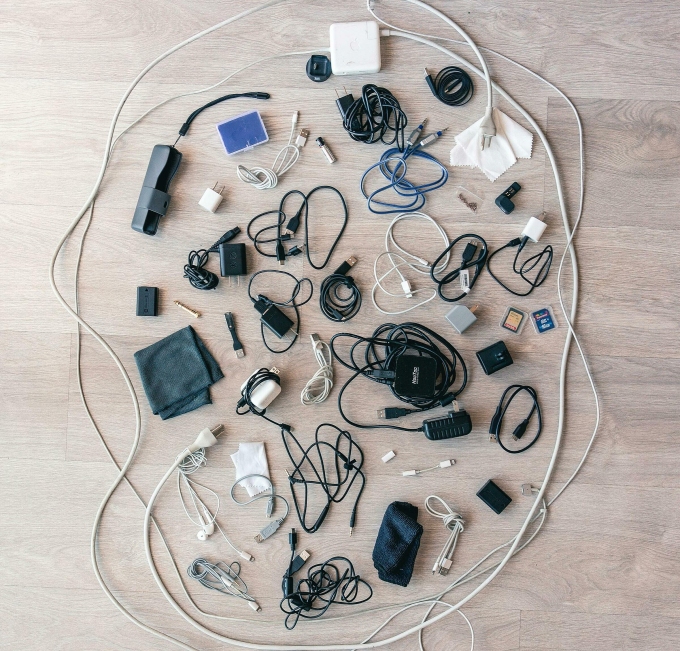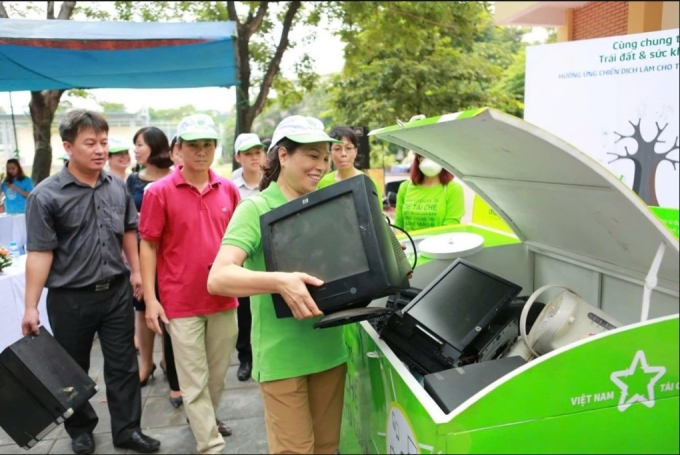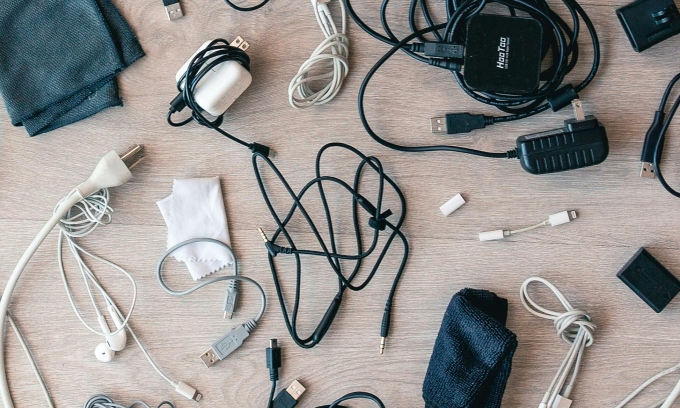“Fast tech” refers to small, low-cost electronics, often bought online for short-term use at prices as low as a few dollars. These range from mini fans, charging cables and headphones to toys and electric toothbrushes. Many are difficult to repair and quickly discarded.
Minh Phuong, a 20-year-old student, says she frequently buys fast tech items on e-commerce platforms because it is affordable and trendy. “The longest I used was a headphone for about two years before it broke and I just threw it away,” she says, adding that such items are hard to recycle.
Ngoc Anh, 31, buys mini fans and cheap chargers online. “I only use the fan a few times during summer,” she says. “After a year the charger stopped working, so I threw it in the bin because I did not know how to recycle it.”

Cables, headphones, chargers and other electronic items. Photo from Pexels
For Hoan, 62, a retired electronics repairman in Hanoi, small broken gadgets are either fixed at home or sold to scrap collectors. “I believe scrap buyers sort and sell materials to proper facilities. They know who will buy the copper, who will buy the plastic.”
According to a United Nations report released last year, Vietnam generated 516,000 tons of e-waste in 2022, double the volume of two years earlier, driven by the boom in digital consumption and low prices.
The problem is global. The U.N.’s Global E-waste Monitor found that worldwide e-waste increased by 82% between 2010 and 2022 and is expected to rise another 32% by 2030 to 82 million tons. Only 22.3% of e-waste in 2022 was collected through formal recycling systems. But even this limited recycling helped reduce greenhouse gases by 52 million tons by reusing metals instead of mining anew.
Since 2010 e-waste has grown five times faster than formal collection and recycling. Most discarded electronics end up in landfills or informal recycling systems, raising pollution risks and harming human health. The U.N. report said small devices such as toys and vacuum cleaners have particularly low recycling rates of just 12% while making up a third of all e-waste.
Laura Young, an environmental scientist and campaigner, was quoted as saying by British newspaper The Guardian that fast tech represents a new kind of environmental threat, not only because of the potentially toxic chemicals many contain but also because of their sheer volume and disposability.
“We have never had throwaway technology like this before. And I think people maybe just genuinely don’t realise that there are electronic components inside of a lot of these tiny devices.”
In the U.K., spending on fast tech rose from £2.8 billion (US$3.8 billion) in 2023 to an estimated £11.6 billion in 2025, according to market research firm Opinium. Nearly 22 million fast tech items, containing valuable metals like lithium, copper and gold, were unused just one month after purchase. Material Focus, a U.K.-based nonprofit that is focused on tackling e-waste, estimated that 1.14 billion small electronic items are bought in the U.K. each year, with half of them discarded at the rate of 19 per second.

People hand in old electronics at a event held by environmental organization Vietnam Recycles. Photo from Vietnam Recycles
Young urged consumers to collect devices and take them to the nearest recycling point, or consider repair, reuse or renting instead of buying. In the U.K. people can use the online Recycling Locator to find one of 30,000 collection points. In the U.S., the Department of Energy launched a $14 million program in 2024 to fund more than 1,000 battery collection sites nationwide.
In Vietnam, environmental organizations such as Tagom and Vietnam Recycles accept e-waste, though collection rules vary depending on recycling capacity. Tagom, which operates only in Hanoi, accepts limited amounts per person: up to 20 batteries, five medium-sized devices, or 10 small ones. Vietnam Recycles runs eight collection points in Hanoi and HCMC, accepting phones, televisions, monitors, batteries, and headphones.
Despite years of operation, these groups face challenges. Vietnam Recycles says low public awareness of the hazards posed by e-waste causes many to discard devices in household bins or sell them to informal collectors and unlicensed facilities.
Nguyen Thanh, 37, often buys cheap headphones and keyboards online. He says he uses them for six to 12 months before giving them away or selling them. He keeps items that cannot be reused in a separate box. “I don’t want to throw them in the trash because I know it will cause pollution.”
His apartment complex has a collection box for old batteries, which he uses regularly.
Both Phuong and Ngoc Anh say they will be happy to recycle if there is clearer information and processes.

